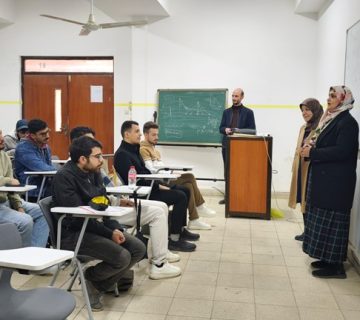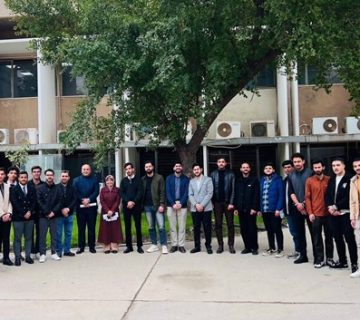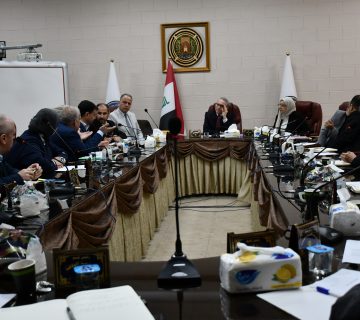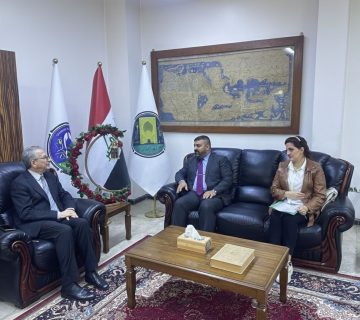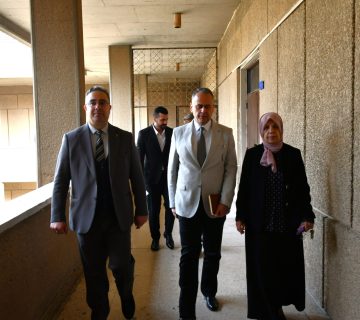A thesis discussion was held on Wednesday 20-12-2023 in Tigris (Dijilah) Hall. This thesis was presented by student (Shaker Jabbar Khuder) and titled as:
“The Reuse of Drainage Water for Irrigation Purposes Using Membrane Techniques”
After discussing the student, listening to his defense, and evaluating the level of the thesis, the student was granted a master’s degree in Water Resources Engineering – Water Resources. With High Very Good Degree
The discussion committee was consisted by the following:
Prof. Dr. Haider Abdul Ameer Khudhier ————————Chairman
Prof. Dr. Mohammed Abdul Khaliq Ibrahim ———— —– Membership
Lect. Dr. Mohammed Rashid Dhair——————————- Membership
Prof. Dr. Basim Sh. Abed ——————————————First Supervisor
Dr. Anmar Jawdat Jassim ————————————– Second Supervisor
The Thesis Summarized as Following: –
Drainage water reuse has recently gained popular as a critical component of water resource management due to shortages in freshwater resources and growing environmental concerns. Membrane processes tehnilogy are essential for advanced reclamation of drainage water reuse for irrigation purposes.
Tests were performed on five different types of membranes techniques systems that available in the local marktes to identify most suitable type which produce high flowrate with higher removal efficiency of total dissolved soluds (TDS). These types were most; Seawatersystem, membrane Brackish water, membrane Sea Maxx, membrane type AG, and the reverse osmosis RO type, which have discharges ranged between 1000 and 1500 liters/hour and a produced tatal dissolved solids ranged between 4.6 mg/L and 340 mg/L. On those bases of the results, the third type was chosen, and a pilot plant of producing was installed to be used for irrigating a total field area of 1250 square meter with different mixing ratios. The field was divided to five subfield and a typical surface drip irrigation system was installed on these fields to irrigate the yellow corn crop that was planted.
The treated water from the membranes was used to grow the maize crop, with the field divided into five parts. The first part is irrigated directly with wastewater. The second part is irrigated with wastewater mixed with 25% of the treated (desalinated) water, and the third part is irrigated with wastewater mixed with 50% of the treated water. The fourth part is irrigated with wastewater mixed with 75% of the treated water, while the fifth and final part is irrigated with treated water only.
The main objectives for this thesis are:
The current study intends to evaluate the use of membranes to improve drainage water for irrigation purposes through the following objectives:
- Specify the most suitable type of desalination membrane to produce suitable irrigation water from the drainage water.
- Obtain the best production rate of membrane desalination water reaching the maximum rate of both water production and salt removal.
- Comparing the quality of the desalinated water that was made to the Iraqi standards for irrigation water, the American Salinity Laboratory’s classification of irrigation water, and then the Food and Agriculture Organization’s (FAO) guide for irrigation water quality,
- determining the most sensible and suitable ratio to combine desalinated and salt water for agricultural irrigation.
- Determine the impact of mixed water use on the yield of yellow maize crops.
Recommendations:
- The Ministry of Water Resources, must contract with foreign companies specialized in designing and implementing water desalination plants, especially those that operate using membrane technology.
- Supporting the Iraqi farmer and peasant financially by providing soft loans so that he can purchase a desalination plant through which he can cultivate his land and provide a decent means of living for him in particular and the country in general.
- Importing desalination plants in large numbers so that the farmer can buy them with his own money and have a cheaper price
- Supporting researchers in the field of water desalination financially and morally.



